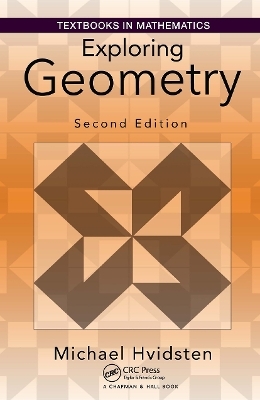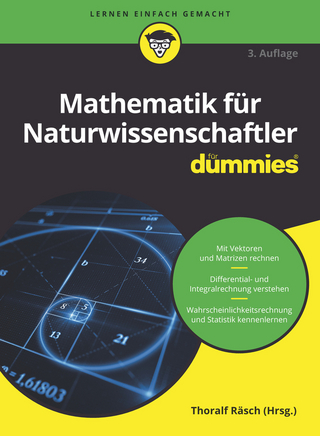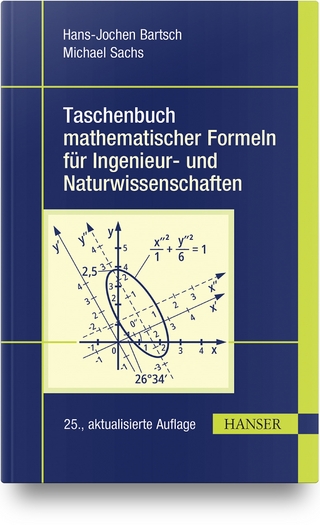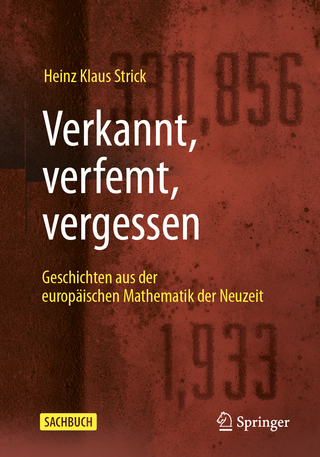
Exploring Geometry
CRC Press (Verlag)
978-1-032-47706-0 (ISBN)
Exploring Geometry, Second Edition promotes student engagement with the beautiful ideas of geometry. Every major concept is introduced in its historical context and connects the idea with real-life. A system of experimentation followed by rigorous explanation and proof is central. Exploratory projects play an integral role in this text. Students develop a better sense of how to prove a result and visualize connections between statements, making these connections real. They develop the intuition needed to conjecture a theorem and devise a proof of what they have observed.
Features:
Second edition of a successful textbook for the first undergraduate course
Every major concept is introduced in its historical context and connects the idea with real life
Focuses on experimentation
Projects help enhance student learning
All major software programs can be used; free software from author
Michael Hvidsten is Professor of Mathematics at Gustavus Adlophus College in St. Peter, Minnesota. He holds a PhD from the University of Illinois. His research interests include minimal surfaces, computer graphics and scientific visualizations, and software development. Geometry Explorer software is available free from his website.
Geometry and the Axiomatic Method
Early Origins of Geometry
Thales and Pythagoras
Project 1 - The Ratio Made of Gold
The Rise of the Axiomatic Method
Properties of the Axiomatic Systems
Euclid's Axiomatic Geometry
Project 2 - A Concrete Axiomatic System
Euclidean Geometry
Angles, Lines, and Parallels ANGLES, LINES, AND PARALLELS 51
Congruent Triangles and Pasch's Axiom
Project 3 - Special Points of a Triangle
Measurement and Area
Similar Triangles
Circle Geometry
Project 4 - Circle Inversion and Orthogonality
Analytic Geometry
The Cartesian Coordinate System
Vector Geometry
Project 5 - Bezier Curves
Angles in Coordinate Geometry
The Complex Plane
Birkhoff's Axiomatic System
Constructions
Euclidean Constructions
Project 6 - Euclidean Eggs
Constructibility
Transformational Geometry
Euclidean Isometries
Reflections
Translations
Rotations
Project 7 - Quilts and Transformations
Glide Reflections
Structure and Representation of Isometries
Project 8 - Constructing Compositions
Symmetry
Finite Plane Symmetry Groups
Frieze Groups
Wallpaper Groups
Tilting the Plane
Project 9 - Constructing Tesselations
Hyperbollic Geometry
Background and History
Models of Hyperbolic Geometry
Basic Results in Hyperbolic Geometry
Project 10 - The Saccheri Quadrilateral
Lambert Quadrilaterals and Triangles
Area in Hyperbolic Geometry
Project 11 - Tilting the Hyperbolic Plane
Elliptic Geometry
Background and History
Perpendiculars and Poles in Elliptic Geometry
Project 12 - Models of Elliptic Geometry
Basic Results in Elliptic Geometry
Triangles and Area in Elliptic Geometry
Project 13 - Elliptic Tiling
Projective Geometry
Universal Themes
Project 14 - Perspective and Projection
Foundations of Projective Geometry
Transformations and Pappus's Theorem
Models of Projective Geometry
Project 15 - Ratios and Harmonics
Harmonic Sets
Conics and Coordinates
Fractal Geometry
The Search for a "Natural" Geometry
Self-Similarity
Similarity Dimension
Project 16 - An Endlessly Beautiful Snowflake
Contraction Mappings
Fractal Dimension
Project 17 - IFS Ferns
Algorithmic Geometry
Grammars and Productions
Project 18 - Words Into Plants
Appendix A: A Primer on Proofs
Appendix A A Primer on Proofs 497
Appendix B Book I of Euclid’s Elements
Appendix C Birkhoff’s Axioms
Appendix D Hilbert’s Axioms
Appendix E Wallpaper Groups
| Erscheinungsdatum | 11.01.2023 |
|---|---|
| Reihe/Serie | Textbooks in Mathematics |
| Zusatzinfo | 557 Illustrations, black and white |
| Verlagsort | London |
| Sprache | englisch |
| Maße | 156 x 234 mm |
| Gewicht | 453 g |
| Themenwelt | Mathematik / Informatik ► Mathematik ► Allgemeines / Lexika |
| Mathematik / Informatik ► Mathematik ► Geometrie / Topologie | |
| ISBN-10 | 1-032-47706-7 / 1032477067 |
| ISBN-13 | 978-1-032-47706-0 / 9781032477060 |
| Zustand | Neuware |
| Informationen gemäß Produktsicherheitsverordnung (GPSR) | |
| Haben Sie eine Frage zum Produkt? |
aus dem Bereich


